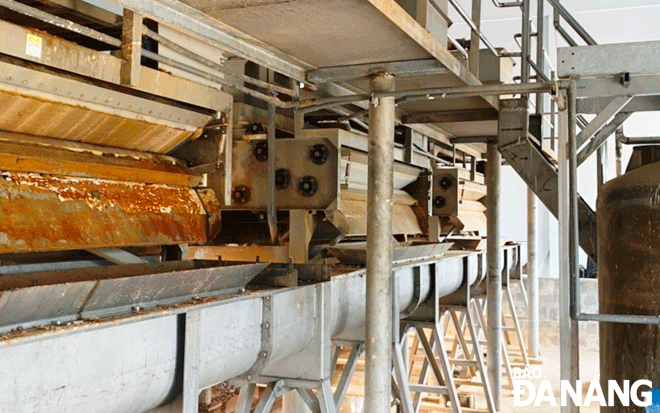More investments needed into advanced sludge treatment, recycling plant
In addition to urgently completing procedures to start factories with advanced waste incineration technology for power generation, experts and scientists have suggested that Da Nang need to invest in recycling plants soon, treating other types of waste, especially sewage sludge and septic tank sludge.
 |
| Operating the sludge drying system at Khanh Son leachate treatment station in Lien Chieu District. Photo: HOANG HIEP |
Currently, every day, wastewater treatment stations and leachate treatment stations in the city generate more than 20 tonnes of (wet) sludge per day. This volume of sludge is coarsely treated by pressing and drying stations to reduce volume, then transported to the Khanh Son landfill in Lien Chieu District) for burial.
Deputy General Director of Da Nang Urban Environment Joint Stock Company Nguyen Dang Huy informed: “Every day, we receive more than 10 tonnes of dry sludge for treatment. In the future, the city has a plan to call for investment into a plant for treating sewage and septic tank sludge for recycling and reusing this type of waste, especially reuse beneficial minerals and elements.
The problem of treating waste sludge generated in urban areas with advanced technology to replace traditional landfills is essential because the landfill area in the city is increasingly narrow. In 2019, the Da Nang University of Science and Technology cooperated with Mikuniya Corporation in Japan to install at the school a system of equipment to treat sludge from wastewater treatment plants in Da Nang with the use of Mishimax technology and a capacity of 50kg/day (Mishimax MK50).
On August 30, the school cooperated with Mikuniya Corporation to organise a workshop on wastewater sludge treatment and urban biomass using Mishimax technology after 3 years of research and testing so as to treat sewage sludge using the above-mentioned technology with some initial positive research results brought about, especially the rate of reduction in volume of wastewater after treatment from 85-90%.
The post-treatment products are stable and have high potential, providing many minerals for plants and green-covered areas across Da Nang, instead of being buried as in Viet Nam as presently or being burned like in advanced countries, thereby contributing to reducing the greenhouse effect generated by combustion.
Assoc. Prof. Dr. Tran Van Quang, a lecturer at the Faculty of Environment, the Da Nang University of Science and Technology acknowledged: “Currently, localities have a high demand for sludge treatment as well as the reuse of green waste. The product after sludge treatment by this technology is used as a clean soil for growing crops.
Mr. Makoto Tokuoka, Director of Decomposition and Fermentation Technical Services Company of Mikuniya Corporation said: “We are looking forward to transferring Mishimax technology and investing in a sludge treatment plant in Da Nang to secure the environmental sanitation for the city in the future”.
According to experts and managers, burying sewage sludge and septic tank sludge is cheap, but in the long run it will take a lot of land for burying. In the condition that the land fund for landfilling in Da Nang has many limitations, it is necessary to invest in a recycling plant, treat all kinds of sludge and septic tank sludge.
In the planning area of Khanh Son Solid Waste Treatment Complex, the city has reserved an area forplanning the construction of a sewage sludge and septic tank sludge treatment plant and is calling for investment flows in it. To be effective and successful, the product after sludge treatment must be clean soil for tree planting.
Director of the Department of Natural Resources and Environment To Van Hung also affirmed: "The city urgently needs a recycling and treatment plant for various types of sludge, so it is calling for investment into a complex to treat hazardous waste as well as sewage and septic tank sludge.
Reporting by HOANG HIEP - Translating by A.THU








